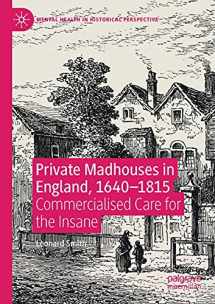
Private Madhouses in England, 1640–1815: Commercialised Care for the Insane (Mental Health in Historical Perspective)
Book details
Summary
Description
Review "It may have been felt impossible to add anything meaningful to Parry-Jones's magnificent The Trade in Lunacy (1972), but Len Smith has undoubtedly managed to do so. Drawing on an incredible range of often obscure sources, many culled from local archives, he provides a definitive survey of these strange places integral to the first stirrings of specialist institutional treatment for people with mental health problems. The combination of broad canvas and local detail is remarkable, substantially resetting what we know about these 'madhouses', their constitution and contribution, for both good and ill, with a treasure-trove of new insights and information provided on every page." (Christopher Philo, Professor of Geography, University of Glasgow, UK, and author of The Space Reserved for Insanity (2004)) Product Description This book examines the origins and early development of private mental health-care in England, showing that the current spectacle of commercially-based participation in key elements of service provision is no new phenomenon. In 1815, about seventy per cent of people institutionalised because of insanity were being kept in private ‘madhouses’. The opening four chapters detail the emergence of these madhouses and demonstrate their increasing presence in London and across the country during the long eighteenth century. Subsequent chapters deal with specific aspects in greater depth - the insane patients themselves, their characteristics, and the circumstances surrounding admissions; the madhouse proprietors, their business activities, personal attributes and professional qualifications or lack of them; changing treatment practices and the principles that informed them. Finally, the book explores conditions within the madhouses, which ranged from the relatively enlightened to the seriously defective, and reveals the experiences, concerns and protests of their many critics. Review “His meticulous research unearths a rich array of publications, print sources, parliamentary evidence, and newspapers, while his close scouring of local archives has produced a mass of detailed evidence across the country with which to compare and contrast provision in different localities. … Smith’s analysis is both readable and well informed as he unpicks the emergence of the trade of lunacy in meticulous detail … concentrated predominantly in the East End, with the various provincial districts of England.” (Hilary Marland, Journal of British Studies, Vol. 60 (2), April, 2021) From the Back Cover This book examines the origins and early development of private mental health-care in England, showing that the current spectacle of commercially-based participation in key elements of service provision is no new phenomenon. In 1815, about seventy per cent of people institutionalised because of insanity were being kept in private ‘madhouses’. The opening four chapters detail the emergence of these madhouses and demonstrate their increasing presence in London and across the country during the long eighteenth century. Subsequent chapters deal with specific aspects in greater depth - the insane patients themselves, their characteristics, and the circumstances surrounding admissions; the madhouse proprietors, their business activities, personal attributes and professional qualifications or lack of them; changing treatment practices and the principles that informed them. Finally, the book explores conditions within the madhouses, which ranged from the relatively enlightened to the seriously defective, and reveals the experiences, concerns and protests of their many critics. About the Author Leonard Smith is Honorary Senior Research Fellow at the Institute of Applied Health Research, University of Birmingham, UK. His publications include ‘Cure, Comfort and Safe Custody’: Public Lunatic Asylums in Early Nineteenth-Century England (1999), Lunatic Hospitals in Georgian England, 1750-1830 (2007), a


We would LOVE it if you could help us and other readers by reviewing the book
Book review



